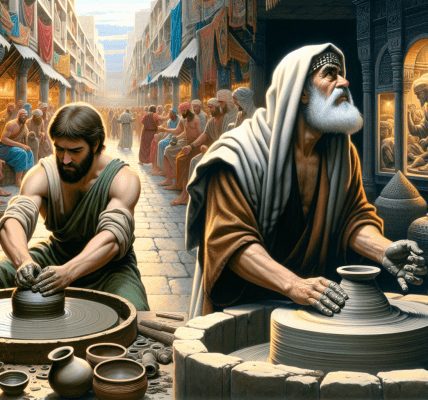**The Feast of King Ahasuerus: A Tale of Pride and Providence**
In the opulent halls of Shushan the palace, the golden rays of the sun filtered through the towering columns, casting shimmering reflections upon the polished marble floors. King Ahasuerus, ruler of the vast Persian Empire, sat upon his throne, resplendent in robes woven with threads of purple and crimson, his golden crown gleaming upon his brow. The year was the third of his reign, and his heart swelled with pride as he surveyed the riches of his kingdom—a dominion stretching from India to Ethiopia, over one hundred and twenty-seven provinces.
To display his grandeur, the king decreed a magnificent feast—one that would last one hundred and eighty days, a spectacle of unparalleled extravagance. Princes, nobles, and governors from every corner of the empire journeyed to Shushan, their caravans laden with gifts of spices, silks, and precious stones. The palace gardens, lush with myrtle, aloes, and fragrant blossoms, became the setting for this royal exhibition.
The king’s pavilion was adorned with fine white linen and violet hangings, fastened with cords of fine linen and purple to silver rings set in pillars of marble. Couches of gold and silver rested upon a mosaic pavement of porphyry, marble, mother-of-pearl, and precious stones. Wine flowed freely from golden goblets, each one distinct in design, for the king’s bounty knew no bounds. Yet, in accordance with Persian custom, no man was compelled to drink beyond his desire, for the king’s steward had ordered that all should be treated with honor.
While the men reveled in the splendor of the king’s court, Queen Vashti, famed for her beauty, hosted a separate feast for the women of the palace. In the royal chambers, she sat upon a throne of ivory, her dark tresses adorned with jewels, her garments shimmering like the dawn. The air was sweet with the scent of frankincense, and the sound of lyres and harps filled the space as noblewomen from across the empire gathered in admiration.
On the seventh day of the feast, when the king’s heart was merry with wine, he summoned his seven chamberlains—Mehuman, Biztha, Harbona, Bigtha, Abagtha, Zethar, and Carcas—and commanded them to bring Queen Vashti before him, wearing the royal crown, that he might display her beauty to the people and the princes. For she was fair to behold, and the king wished all to gaze upon her loveliness.
But when the chamberlains delivered the king’s command, Vashti’s countenance grew troubled. To appear unveiled before a drunken assembly of men was not only improper but beneath her dignity as queen. With quiet resolve, she refused the king’s order.
A hushed silence fell over the banquet hall as the chamberlains returned with Vashti’s answer. The king’s face darkened with fury, his pride wounded before his nobles. The wine that had once brought him joy now stoked the fires of his wrath.
At once, he consulted his wise men—the seven princes of Persia and Media who sat closest to his throne—men learned in law and judgment. “What shall be done to Queen Vashti,” he demanded, “for she has not obeyed the command of the king?”
Memucan, the most outspoken of the princes, rose and declared, “Queen Vashti has wronged not only the king but all the princes and peoples of the empire. For when word spreads that the queen defied the king’s command, women throughout the land will despise their husbands’ authority. Let a royal decree be issued: Vashti shall come no more before the king, and her position shall be given to another, worthier than she. When this judgment is proclaimed across the empire, all wives shall honor their husbands, from the greatest to the least.”
The counsel pleased the king and his princes, and swift messengers carried the decree to every province, written in the languages of every people: “Every man shall be master in his own house.”
Thus, Queen Vashti was cast aside, her fate sealed by pride and defiance. Yet unbeknownst to the king, the Lord of heaven was orchestrating events for a greater purpose—one that would soon bring a humble Jewish maiden named Esther to the throne, through whom the salvation of an entire people would come.
For even in the halls of the mighty, the hand of Providence moves unseen.




